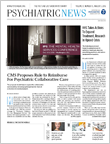Further plans for the development of an APA-owned mental health registry and deliberations about the future of residency training in psychiatry were among the issues on which the Board of Trustees took action last month in Arlington, Virginia.
Board members took another step toward creation of a mental health registry when they voted to have APA’s Finance and Budget Committee explore ways to create cost savings or identify revenue opportunities to build the registry. The motion approved by the Board also called for the committee to report back to Trustees with its evaluation of options at the Board’s October meeting
Additionally, Trustees considered a proposal from the American Board of Psychiatry and Neurology (ABPN) to provide an unrestricted $1 million grant to APA to help develop the registry to ensure that their diplomates can participate.
Development of a mental health registry is expected to help APA members comply with Physician Quality Reporting System (PQRS) and Merit-Based Incentive Payment System (MIPS) requirements and avoid established penalties, which began in 2016 (2 percent) and will increase to 9 percent in 2022. A registry would also allow psychiatrists to submit performance and practice data from the registry for Maintenance of Certification Part 4 credit.
Additionally, a registry will provide a national research database with aggregate de-identified data to help improve patient outcomes, develop new diagnostics and therapeutics, develop practice guidelines, identify gaps in care, inform APA educational programs, help with DSM-5 updates, and support advocacy initiatives. It will also allow APA to develop new psychiatric quality measures (with funding from the Centers for Medicare and Medicaid Services until 2019).
In other business, Trustees—responding to a request for input from ABPN—voted not to support the option of allowing psychiatry residents to use their PGY-4 year of training to begin ACGME-accredited subspecialty fellowship training. (Currently, only residents who enter child and adolescent training are able to use their fourth year of generalist training for subspecialization.)
“Training psychiatrists of the future is something everyone in our field cares deeply about, and there is a diversity of perspectives on whether to create new shorter pathways to complete fellowship training,” Board member Richard Summers, M.D., who is past chair of the Council on Medical Education and Lifelong Learning, told Psychiatric News in comments after the meeting. “I am pleased that the Board upheld a commitment to generalist training and recognized the importance of emphasizing training in addictions, geriatric psychiatry, and psychosomatic medicine in a four-year adult residency.”
Trustees also reaffirmed a decision by the Joint Reference Committee that approval and implementation of an Assembly action paper on APA’s referendum voting procedure is not feasible. The action paper concerns the process for allowing members to vote in a referendum on changes to APA policy; currently, referendum items are included on the ballot for national elections. The Assembly paper, citing low voter turnout, called for referendum items to be voted on when members are sent their dues notices.
Additionally, Trustees voted to approve the recommendation of the Membership Committee to expand the definition of medical student members in the Operations Manual to allow international students to be eligible for membership by adding the following statement after the first sentence in the chapter on medical student members: “Individuals in medical schools outside the U.S. or Canada are also eligible for medical student membership if the school is listed in the World Directory of Medical Schools and the applicant provides proof of enrollment.”
Trustees also approved the nomination of H. Steven Moffic, M.D., to receive the 2016 Administrative Psychiatry Award, and of writer and activist Chirlane McCray, the first lady of New York City, to receive the 2016 Award for Patient Advocacy. ■
APA members can access archived summaries of Board actions
here.

